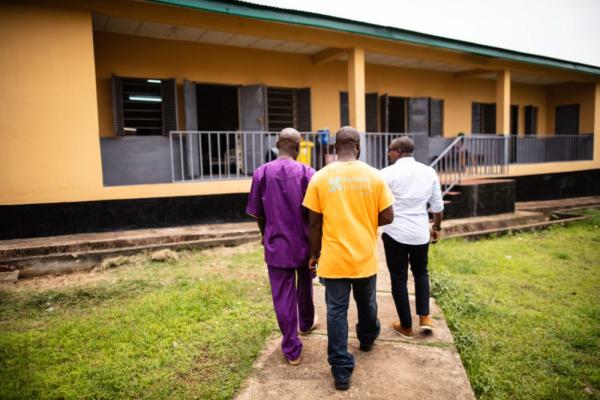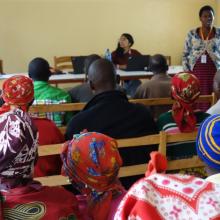The Sierra Leone Psychiatric Hospital is made up of about half a dozen long, low buildings with porticoes, built high on one of Freetown’s rolling hills. The grounds are lush and green. One of the Partners In Health staff has a background in landscaping, and as the buildings have been renovated over the past two years, he has planted gardens between them.
I had the opportunity to visit PIH Sierra Leone and to tour the hospital – the only psychiatric facility in a country of 7.5-million people – in July of this year. The hospital is operated by the Ministry of Health but had been severely under-funded until PIH stepped in with support in December 2017.
Hospital staff told me what the hospital looked like before the partnership with PIH. The electrical system was poor. The plumbing had failed. (Imagine trying to operate a medical facility without working plumbing). The grounds were strewn with waste and excrement. Buildings were crumbling and wards were overcrowded. And perhaps unsurprisingly in such an environment, there was no effective treatment on offer. The hospital had almost no psychiatric medications of any kind, and the primary method of care for patients experiencing acute psychosis was to shackle them to their beds with metal chains.
These challenges had nothing to do with a shortage of staff competence or compassion or care, and everything to do with a shortage of resources.
Thanks to Partners In Health donors, the hospital’s pharmacy is now well-stocked with appropriate medications. The pharmacist spoke with pride about the transformations seen by patients, many of whom have been able to leave the hospital and return to their lives. PIH Sierra Leone’s infrastructure team has delivered a new generator, working electricity in every ward, and clean and operational toilets, bathing facilities and handwashing stations. Patient accommodations remain simple but dignified; each patient has a tidy bed and a bedside table with locking drawers to store valuables.
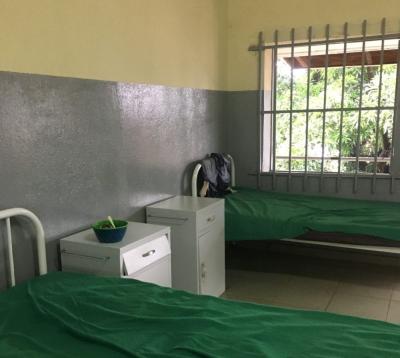
Newly renovated patient accommodations are simple but provide a clean and dignified place for patients to stay while receiving care.
Emily Antze/ Partners In Health Canada
The chains are gone. Proper treatment and medication has made them unnecessary. In the rare cases that a patient must be restrained, humane restraints are employed.
PIH has also provided training to the hospital’s staff to ensure they have the skills and knowledge necessary to successfully support their patients. I visited over lunch time; men and women reclined on beds and on the open porches and chatted with each other and the nurses while eating big bowls of rice and stew, prepared in the hospital kitchen. The atmosphere was calm and pleasant.
While fewer long-term inpatients mean the wards are no longer overcrowded, additional wards are still being built; there is huge country-wide need for mental health care and as word spreads of the effective treatment and dignified conditions now present at the hospital, patient demand will increase.
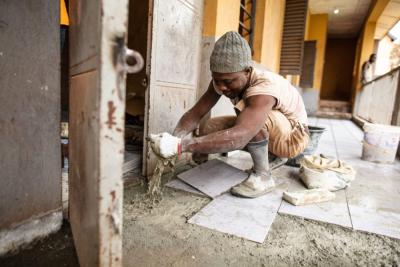
Infrastructure improvements continue in order to expand the hospital’s ability to provide quality mental health care.
Jon Lascher / Partners In Health
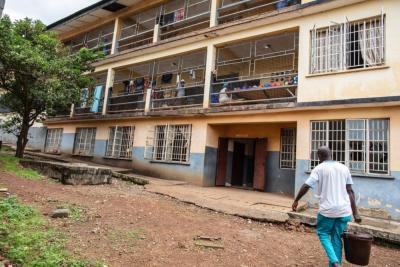
Jon Lascher / Partners In Health
Finding the courage to seek mental health care and deal with the associated stigma can be extremely difficult, as anyone who has faced their own mental health challenges or supported a loved one knows all too well. In impoverished countries like Sierra Leone, the journey is even more difficult — but no less important. Patients are no less deserving of the best care the world knows how to offer. These days at the Sierra Leone Psychiatric Hospital, they’re much closer to getting it.
